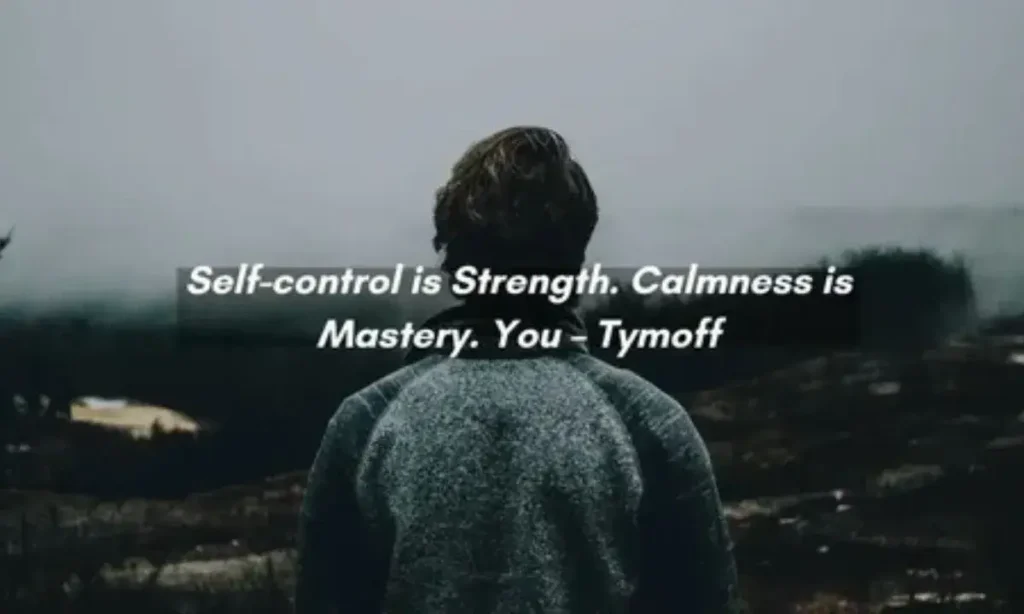In a world where stress, noise, and emotional reactions dominate our daily lives, the timeless quote — “Self-control is strength. Calmness is mastery. You.” by Tymoff — stands as a reminder of what true power looks like. It’s not about dominance or control over others. It’s about mastering yourself. This philosophy captures the essence of emotional intelligence, discipline, and inner peace — the very foundations of personal mastery.
Let’s dive deep into what this quote truly means, how it connects to psychology and real-world success, and how you can develop both self-control and calmness to live a more focused, resilient, and powerful life.
Table of Contents
The Power of Self-Control
Defining Self-Control
Self-control is the ability to manage emotions, thoughts, and behaviors in pursuit of long-term goals. It’s not about suppression — it’s about intentional direction. According to behavioral psychology, it’s the skill that separates impulsive reactions from deliberate responses.
In essence, self-control is choosing progress over pleasure.
When you practice self-control, you develop:
- Resilience during emotional challenges
- Clarity in decision-making
- Patience in pursuit of goals
It’s the quiet strength that keeps you grounded when life feels chaotic.
The Science Behind Self-Control
From a neuroscience standpoint, self-control is governed by the prefrontal cortex, the brain’s decision-making center. This region regulates impulses from the amygdala, which triggers emotional reactions like anger or fear.
According to research from the American Psychological Association, individuals with higher self-control exhibit:
- Better academic performance
- Healthier relationships
- Lower stress levels
- Improved long-term happiness
A famous study, the Stanford Marshmallow Experiment, tested delayed gratification in children. Those who resisted immediate temptation (waiting for two marshmallows instead of taking one right away) were more successful decades later — proving that self-control predicts long-term achievement.
Real-World Applications of Self-Control
Self-control shows up in every area of life — from leadership to love.
Here’s how it shapes real-world outcomes:
| Situation | Impulsive Reaction | Self-Controlled Response |
|---|---|---|
| Workplace conflict | React emotionally | Listen, pause, and respond logically |
| Financial stress | Overspend under pressure | Budget and plan intentionally |
| Relationship issues | Argue defensively | Communicate calmly and assertively |
| Health habits | Skip workouts | Commit despite discomfort |
When emotions are high, self-control bridges the gap between reaction and reason. It helps you stay consistent, even when motivation fades.
Consequences of Losing Self-Control
Without self-control, emotions dictate your life.
The costs are high:
- Poor decisions made in anger or fear
- Damaged relationships from impulsive words
- Stress and burnout from emotional overreactions
- Lost opportunities due to lack of discipline
As Tymoff’s philosophy suggests, strength isn’t found in control over others but in control over oneself.
Calmness as Mastery
What Calmness Truly Means
Calmness isn’t weakness or indifference — it’s emotional mastery. It’s the state of being centered, where external chaos doesn’t dictate internal peace. Calm people think clearly, act wisely, and communicate effectively.
Both Stoicism and Buddhism emphasize calmness as the path to enlightenment and wisdom. Stoic philosophers like Marcus Aurelius taught that calmness allows us to respond to events rather than react blindly to them.
Calmness and Leadership
Calmness is a hallmark of effective leadership. Think of figures like Nelson Mandela, Barack Obama, or Mahatma Gandhi — all renowned for maintaining composure under pressure. Their calm demeanor inspired trust, unity, and strength.
Leaders who embody calmness:
- Inspire confidence in their teams
- Make better strategic decisions
- Handle crises with clarity
- Model emotional intelligence
Study Insight: A 2019 study from Harvard Business Review found that leaders who manage stress effectively increase team performance and morale by over 25%.
Psychological Benefits of Calmness
Calmness directly impacts both the mind and body. Here’s how it transforms your physiology and behavior:
| Aspect | Without Calmness | With Calmness |
|---|---|---|
| Heart Rate | Elevated, irregular | Steady and balanced |
| Focus | Scattered and reactive | Sharp and deliberate |
| Hormones | High cortisol (stress) | Lower cortisol, balanced serotonin |
| Relationships | Conflict-prone | Empathetic and patient |
Calmness acts as an internal stabilizer, improving creativity, empathy, and problem-solving ability.
When your mind is calm, your potential expands.
Calmness in Daily Life
Calmness shows up in how you handle everyday stressors:
- When traffic jams don’t ruin your morning
- When workplace tension doesn’t derail your focus
- When criticism doesn’t trigger defensiveness
In daily life, calmness is your mental armor. It helps you maintain control in a world designed to provoke reactions.
Mindfulness and breathing techniques play a huge role here.
A few effective practices include:
- Box breathing: Inhale 4 seconds → Hold 4 → Exhale 4 → Hold 4
- Body scans: Acknowledge tension and release it consciously
- Meditative pauses: Take short breaks to reset your mind during stress
Developing Self-Control and Calmness
These traits aren’t inborn — they’re cultivated through practice, awareness, and discipline.
Self-Awareness: The Foundation
Every transformation starts with self-awareness. You can’t control what you don’t recognize.
Track your emotional patterns:
- What triggers your anger, anxiety, or impatience?
- What situations make you lose focus or composure?
- How do you usually react — and what’s the result?
Use journaling, introspection, or digital mindfulness apps like Calm or Headspace to identify recurring patterns.
Practicing Discipline and Delayed Gratification
Self-control grows with consistent practice. Start small:
- Delay checking your phone for 10 minutes after waking up.
- Say no to small temptations — like sugary snacks or impulse shopping.
- Use the 10-second rule before reacting to emotional triggers.
Athletes and entrepreneurs embody this principle. They practice discipline daily through training routines, time blocking, and goal-setting.
Consistency builds control.
Mindfulness and Meditation
Mindfulness strengthens the prefrontal cortex — the same part of the brain that controls willpower and decision-making.
According to a study by Harvard University, 8 weeks of mindfulness training thickened brain regions linked to attention and emotional regulation.
Try:
- Meditation: Start with 5–10 minutes daily.
- Gratitude reflection: List three things you’re grateful for each night.
- Focused breathing: Anchor attention on each inhale and exhale.
Over time, these habits enhance emotional balance and cognitive clarity.
Emotional Regulation Techniques
To regulate emotions effectively, use the RULER framework developed at Yale University:
- Recognize emotions in yourself and others.
- Understand their causes.
- Label emotions accurately.
- Express feelings appropriately.
- Regulate emotions using healthy strategies.
Also try:
- Cognitive reframing: Replace negative thoughts with realistic ones.
- Grounding exercises: Feel your feet on the floor, focus on surroundings.
- Reappraisal: Ask, “Will this matter in a year?” before reacting.
These techniques prevent overreaction and promote calm responses even under stress.
Building Resilience Through Practice
Resilience is the byproduct of repeated calm responses.
As Navy SEALs train, they emphasize “calm under fire” — staying composed when everything goes wrong.
That’s not natural; it’s learned through:
- Controlled exposure to stress
- After-action reflection
- Incremental progress tracking
When you repeatedly manage small challenges calmly, your nervous system adapts. Eventually, your default response becomes composed and rational, not panicked or impulsive.
The Tymoff Philosophy
Who Is Tymoff?
Tymoff is a modern philosopher known for succinct yet profound insights on self-awareness, mindset, and emotional balance. His quote — “Self-control is strength. Calmness is mastery. You.” — encapsulates the foundation of his teachings: personal accountability and self-mastery.
The phrase reminds us that strength isn’t external; it’s internal sovereignty.
The Core Message: “You”
The most powerful word in Tymoff’s quote is “You.” It shifts the responsibility inward.
You control your reactions.
You decide how to respond.
You determine whether to remain calm or be consumed by emotion.
As modern psychology confirms, people who take ownership of their emotions are more fulfilled and mentally resilient. Tymoff’s words align perfectly with the principle of internal locus of control — the belief that you influence your own outcomes.
Applying Tymoff’s Philosophy
To live Tymoff’s philosophy, integrate it into everyday life:
- In conflicts, choose understanding over ego.
- In setbacks, choose patience over panic.
- In success, choose humility over pride.
Framework for mastery:
- Awareness – Recognize emotional impulses.
- Control – Pause and evaluate your reactions.
- Calm – Respond thoughtfully and with composure.
- Clarity – Make decisions that reflect long-term wisdom.
Tymoff’s philosophy isn’t about being emotionless — it’s about being emotionally in charge.
Modern Implications and Takeaways
Why This Message Matters Today
In the digital age, we live in constant reaction — to notifications, opinions, and pressures.
Self-control and calmness are the new-age superpowers. They separate the distracted from the focused, and the impulsive from the wise.
Fact: The average person checks their phone over 150 times a day, often out of habit, not necessity. Practicing self-control by limiting digital distractions can dramatically improve focus and mental health.
Key Lessons
- Self-control is strength: It builds character, direction, and focus.
- Calmness is mastery: It enhances clarity, empathy, and problem-solving.
- You are the key: Only you can choose emotional intelligence over reaction.
Action Plan for Readers
Here’s a simple roadmap to strengthen your self-control and calmness:
| Step | Action | Purpose |
|---|---|---|
| 1 | Identify emotional triggers | Build awareness |
| 2 | Practice mindfulness 10 min/day | Develop calm focus |
| 3 | Apply the 10-second pause rule | Strengthen self-control |
| 4 | Journal emotions weekly | Track progress |
| 5 | Reflect and reframe | Create inner peace |
Even small, consistent actions lead to lifelong transformation.
Conclusion
“Self-control is strength. Calmness is mastery. You.” — Tymoff’s timeless philosophy reminds us that power isn’t loud; it’s quiet. True mastery isn’t about controlling the world around you but commanding the world within you.
When you cultivate self-control, you build strength. When you master calmness, you gain freedom.
In both lies your greatest power — you.



